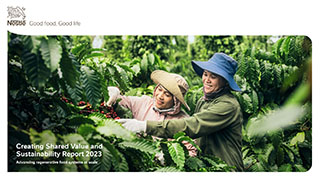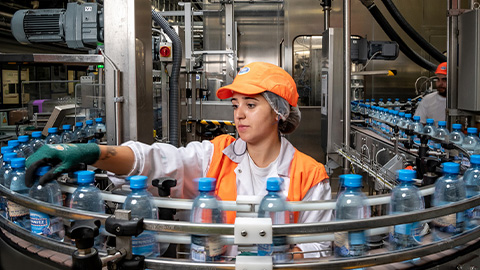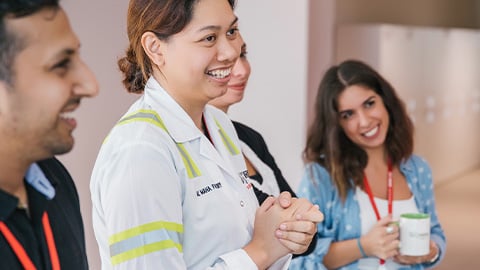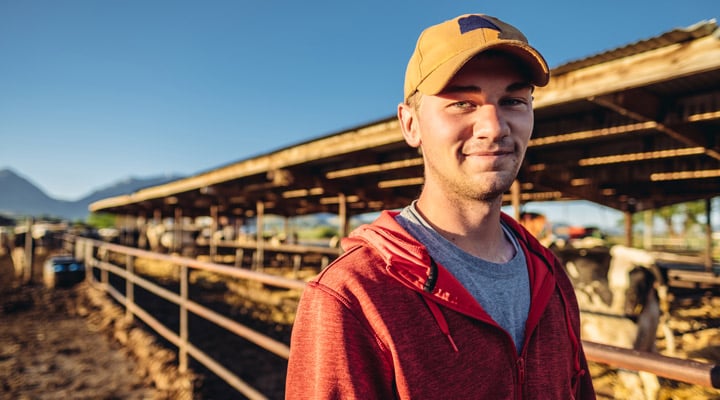Right to water and sanitation

Access to safe, affordable and reliable water, sanitation and hygiene (known as WASH) is a basic human right.
The right to water and sanitation and the promotion of good hygiene are important to Nestlé’s operations and supply chains. We rely on workers being able to access safe water, sanitation and hand-washing facilities.
Without this, we would be unable to staff our facilities and meet the basic needs of our employees. We also need to make sure these sites do not have a negative impact on local communities’ ability to access safe water and sanitation. This is a key element of our license to operate locally.
SDG contributions
Demonstrating a clear commitment
Our position on access to water, sanitation and hygiene is clear: wherever we operate, access to drinking water in the community must have priority over the activities of the company.
To make sure our initiatives have the most positive impact, we involve local communities and audit every factory on the strength of these community relations every year.
Our key actions
- Strengthen our risk assessment approach to, and prevention and mitigation of, WASH risks across Nestlé's value chain, in particular our agricultural supply chains
- Promote consistent adoption of WASH-related Human Rights Due Diligence across Nestlé's value chain, in particular our agricultural supply chains
- Engage and build capacity of our relevant staff on WASH risks and impacts
- Collaborate with peers and stakeholders to help address systemic WASH risks and develop common approaches and tools on access to WASH
- Identify government engagement opportunities to strengthen access to WASH
A coordinated, global approach to water
For some years Nestlé has used a precise working methodology to help us identify whom we should engage when considering new water, sanitation and hygiene projects, whether they are planned for our operations, workers or their communities. This was updated in 2019 to help ensure that people in communities that have the most difficulty accessing clean water can play an active part in changes that can affect them.
In 2023, Nestlé participated in a global working group to design the latest standardized approach and set of indicators to quantify how sound water stewardship can generate social, economic and environmental benefits. Convened by the World Resources Institute, the consortium developed updated Volumetric Water Benefit Accounting standards. Known as VWBA 2.0, this method enables companies and communities to measure and disclose their impacts on the shared resource.
We also co-published a report with Human Right 2 Water, prepared in collaboration with the Inter-American Development Bank and the Water Research Commission. The report examined how countries can legislatively safeguard essential elements of the human right to water in worsening climate conditions, and what this means for service providers and businesses.
Recent water improvement projects
Upper Tunuyan River basin, Argentina
- Issue: Run-off from free-flowing wells was being lost before it could be used by the local community.
- Mitigation and benefits: Working with the Irrigation Department of Mendoza, we installed manually closing butterfly valves to minimize losses of water.
Benha, Egypt
- Issue: The Al-Siniti canal had become polluted and silted, with poorly maintained side walls.
- Mitigation and benefits: Teams removed waste and aquatic weeds, and stabilized the sides to prevent water leakage, cleaning the water and making more available for local communities and farmers downstream.
Sheikhupura, Pakistan
- Issue: Inadequate irrigation was creating the pollution of waterways and unsustainable demand of the water table.
- Mitigation and benefits: We made irrigation upgrades, leading to a reduction of groundwater consumption, the prevention of pesticide and fertilizer runoff, maintaining watershed quality, saving energy and increasing crop yields.
Naleczowianka, Poland
-
Issue: Wastewater from our plant was creating avoidable pollution in the Vystra river.
- Mitigation and benefits: We installed UV lamps to improve the water quality before it leaves the site, to enable the recovery of the river and the ecosystems.
Herrera del Duque, Spain
- Issue: The community identified pressures on biodiversity and the diminishing water level of a cherished local stream.
- Mitigation and benefits: The team planted trees, accompanied by sophisticated irrigation channels to enhance biodiversity, reduce evaporation and protect the habitat of an endangered fish species.
Ayutthaya, Thailand
- Issue: Inadequate use of inputs and poor maintenance of a canal had resulted in low water quality of a canal near to the villages Ban Mai and Ban Yang Ngam.
- Mitigation and benefits: Our team partnered the local WWF-led Youth Water Guardian initiative, to establish a learning center and a campaign on the use of fertilisers and pesticides, waste removal and better wastewater management, restoring 21km of this waterway.
Derbyshire, UK
- Issue: The Ecclesbourne River had been diverted into a weir, preventing local fish from migrating and impacting overall biodiversity.
- Mitigation and benefits: Our team is supporting the river’s restoration back to its original channel, bypassing the weir and opening over 28km of the river and its tributaries for many fish species.
Mekong, Vietnam
- Issue: Provincial water management in the Mekong Delta has not kept pace with local demands of agriculture and development leading to pollution and water stress in Tan A City.
- Mitigation and benefits: We provided water supplier LAWACO with financial and technical support to treat more surface water instead of groundwater. This will increase the resilience of the watershed and promote biodiversity and is a component of a wider water regeneration program in the delta.



















